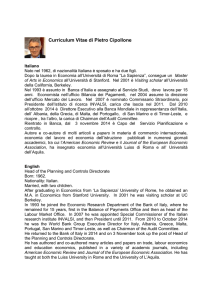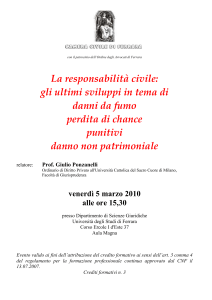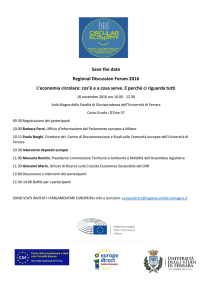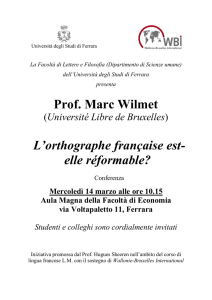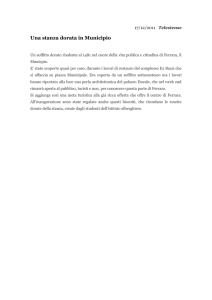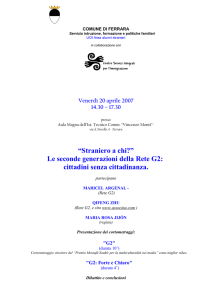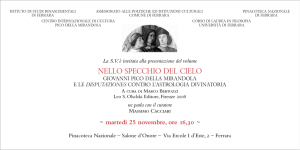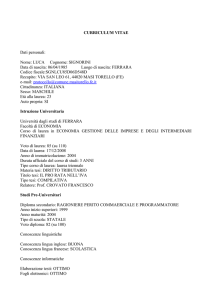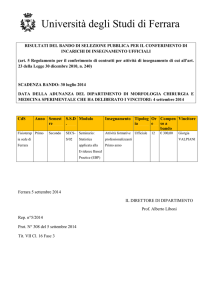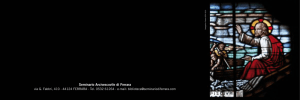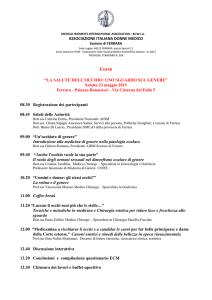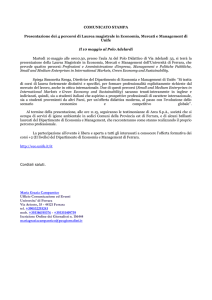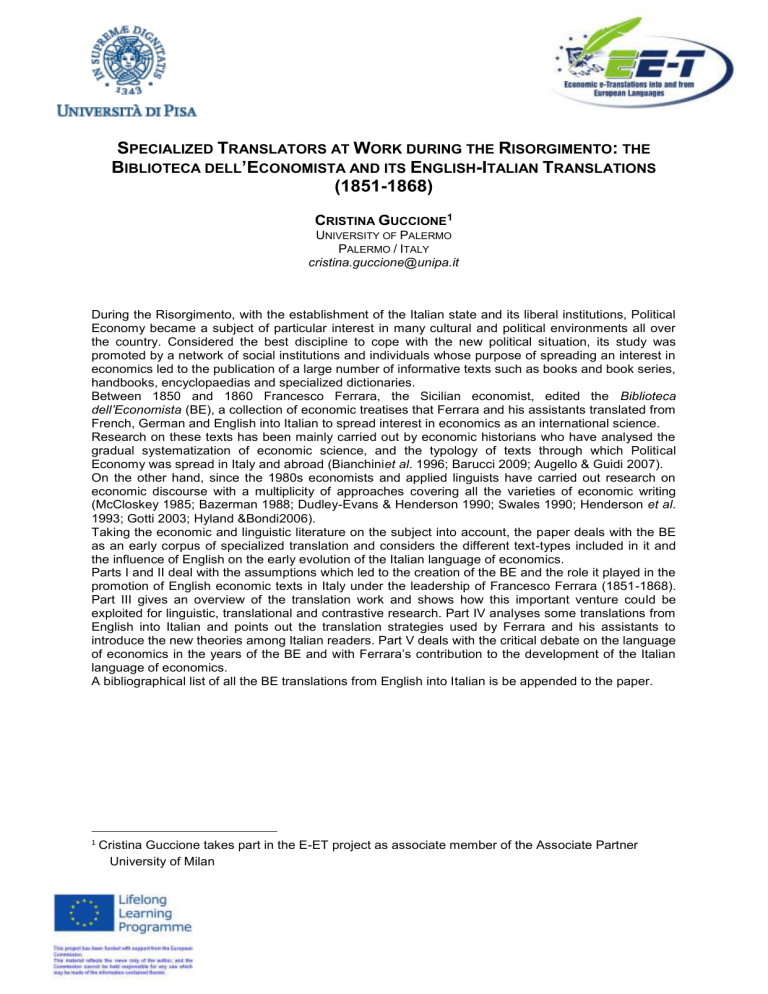
SPECIALIZED TRANSLATORS AT WORK DURING THE RISORGIMENTO: THE
BIBLIOTECA DELL’ECONOMISTA AND ITS ENGLISH-ITALIAN TRANSLATIONS
(1851-1868)
CRISTINA GUCCIONE1
UNIVERSITY OF PALERMO
PALERMO / ITALY
[email protected]
During the Risorgimento, with the establishment of the Italian state and its liberal institutions, Political
Economy became a subject of particular interest in many cultural and political environments all over
the country. Considered the best discipline to cope with the new political situation, its study was
promoted by a network of social institutions and individuals whose purpose of spreading an interest in
economics led to the publication of a large number of informative texts such as books and book series,
handbooks, encyclopaedias and specialized dictionaries.
Between 1850 and 1860 Francesco Ferrara, the Sicilian economist, edited the Biblioteca
dell’Economista (BE), a collection of economic treatises that Ferrara and his assistants translated from
French, German and English into Italian to spread interest in economics as an international science.
Research on these texts has been mainly carried out by economic historians who have analysed the
gradual systematization of economic science, and the typology of texts through which Political
Economy was spread in Italy and abroad (Bianchiniet al. 1996; Barucci 2009; Augello & Guidi 2007).
On the other hand, since the 1980s economists and applied linguists have carried out research on
economic discourse with a multiplicity of approaches covering all the varieties of economic writing
(McCloskey 1985; Bazerman 1988; Dudley-Evans & Henderson 1990; Swales 1990; Henderson et al.
1993; Gotti 2003; Hyland &Bondi2006).
Taking the economic and linguistic literature on the subject into account, the paper deals with the BE
as an early corpus of specialized translation and considers the different text-types included in it and
the influence of English on the early evolution of the Italian language of economics.
Parts I and II deal with the assumptions which led to the creation of the BE and the role it played in the
promotion of English economic texts in Italy under the leadership of Francesco Ferrara (1851-1868).
Part III gives an overview of the translation work and shows how this important venture could be
exploited for linguistic, translational and contrastive research. Part IV analyses some translations from
English into Italian and points out the translation strategies used by Ferrara and his assistants to
introduce the new theories among Italian readers. Part V deals with the critical debate on the language
of economics in the years of the BE and with Ferrara’s contribution to the development of the Italian
language of economics.
A bibliographical list of all the BE translations from English into Italian is be appended to the paper.
1
Cristina Guccione takes part in the E-ET project as associate member of the Associate Partner
University of Milan
REFERENCES
[1] Augello M.M. and M.E.L. Guidi (eds.) 2007, L’Economia divulgata. Stili e percorsi italiani
(1840-1922), voll.1-2-3. Milan: FrancoAngeli.
[2] Babbage Ch. 1835.On the Economy of Machines and Manufactures. London: C. Knight.
[3] Barucci P. 2009.Francesco Ferrara e «La Biblioteca dell’Economista», Il Pensiero Economico
Italiano XVII /1: 183-196.
[4] Bazerman C. 1988.Shaping Written Knowledge: The Genre and Activity of the Experimental
Article in Science. Madison: University of Wisconsin Press.
[5] Bianchini M. et al. (eds.) 1996, Le riviste di economia in Italia (1700-1900). Dai giornali
scientifico-letterari ai periodici specialistici. Milan: FrancoAngeli.
[6] Blavet Abbé J. L. 1871. Recherches sur la nature et les causes de la Richesse des Nations,
traduit de l’anglois de M. Smith, 6 vols. Yverdon.
[7] Dardano M. & Trifone P. 1985. La lingua italiana. Bologna: Zanichelli.
[8] Dudley-Evans T. & W. Henderson (eds.) 1990, The Language of Economics: the Analysis of
Economic Discourse. Oxford: Modern English Publications with the British Council.
[9] Ferrara F. 1955.Opere complete – Prefazioni alla Biblioteca dell’Economista, parte prima. B.
Rossi Ragazzi (ed.) vol. II. Roma: Istituto Grafico Tiberino.
[10] Ferrara F. 2001. Opere complete – Epistoliario (1835-1897), P. F. Asso (ed), vol.XIII. Roma:
Bancaria Editrice.
[11] Garnier G. 1843. Recerches sur la nature et les causes de la Richesse des Nations, revue par
A.J. Blanqui. Paris: Guillaumin.
[12] Gotti M. 2003.Investigatingspecializeddiscourse. Bern: Peter Lang.
[13] Guccione C. 2011. «Le traduzioni dall’inglese nelle prime due serie della Biblioteca
dell’Economista. Ipotesi di studio da una prospettiva linguistica», Storia e Politica III/2: 361378.
[14] Guillaumin G. 1840-1848. Collection des principaux économistes. Paris: Guillaumin.
[15] Henderson W. et al. (eds.) 1993, Economics and Language. London: Routledge.
[16] Hyland K. & M. Bondi (eds.) 2006, Academic Discourse Across Disciplines.Bern: Peter Lang.
[17] Maccabelli T. 1998. «Linguaggio, definizioni e termini dell’economia politica: il contributo di
Malthus, Whately e Senior», Storia del Pensiero Economico 35: 129-166
(http://www.dse.unifi.it/spe/indici/numero35/macca.htm).
[18] MacCulloch J. R. (ed.) 1828.Inquiry into the nature and causes of the wealth of nations by A.
Smith.Edinburgh: Black and Tait.
[19] Magliulo A. 2007, La sistemazione dell’economia politica nell’Italia liberale. Il ruolo delle
traduzioni in italiano di manuali e trattati stranieri (1850-1922) in M.M. Augello & M.E.L. Guidi
(eds.), L’Economia divulgata. Stili e percorsi italiani (1840-1922), vol. III. Milan: FrancoAngeli.
[20] Malthus T.R. 1827. Definitions in Political Economy. London: John Murray.
[21] Marazzini C. 2002. La Lingua Italiana - Profilo storico, III ed. Bologna: Il Mulino.
[22] McCloskey D. 1985. The Rhetoric of Economics. Madison: University of Wisconsin Press.
[23] Mill J. 1830. Elementi di economia politica. Lugano: Ruggia.
[24] Neppi Modona L. 1979. Francesco Ferrara a Torino: carteggio con Giuseppe Todde. Milan:
Giuffré.
[25] Roucher J. A. 1792. Recerches sur la nature et les causes de la Richesse des Nations.
Neuchatel: L. Fauche-Bore.
[26] Senior N. W. 1835. Principes fondamentaux de l’économie politique, tirés des leçons édites
par le Comte Jean Arrivabene.Paris: Aillaud.
[27] Senior N. W. 1836. Principi fondamentali dell’economia politica, tratti da lezioni edite ed
inedite dal traduttore di Mill [Giovanni Arrivabene].Lugano: Ruggia.
[28] Swales J. 1990.Genre Analysis: English in Academic Research Settings. Cambridge:
Cambridge University Press.
[29] Travagliante P. 1996. Cultura economica e dibattito politico nei periodici palermitani degli anni
trenta-quaranta in M. Bianchini et al. (eds), Le riviste di economia in Italia (1700-1900). Dai
giornali scientifico-letterari ai periodici specialistici. Milano: FrancoAngeli. pp. 171-207.

